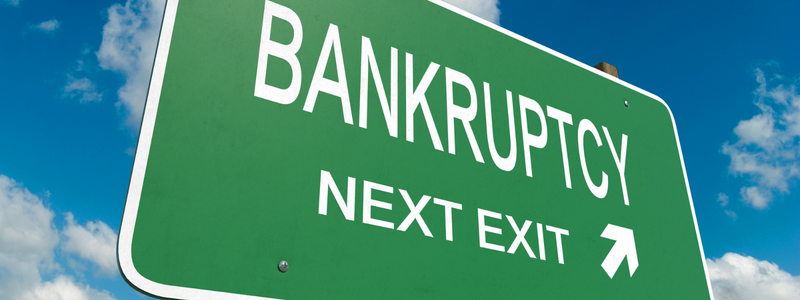
When used responsibly, credit can serve as a stepping stone to the next point of one’s life. Borrowing allows individuals to obtain an otherwise financially out-of-reach education, own a home or purchase a new vehicle. Using loans to spread out the high cost of expenditures that promise future value is the epitome of responsible borrowing. Unfortunately, it’s easy to cross the line between responsible borrowing and downright reckless spending — which, it appears, the majority of Canadians have done. And this often leads to filing for bankruptcy to get out of the spiral.
The average household debt in Canada today is around 170% of disposable income. That means for every $1 the average income earner makes, he or she owes $1.70 in debt. This income to debt ratio has forced many Canadians into filing for bankruptcy. While bankruptcy can help you achieve a debt-free existence, you should make the decision to file only once you’ve explored all other alternatives. One such alternative is debt consolidation. Read on for a comparison of debt consolidation and bankruptcy.
Comparing Debt Consolidation and Bankruptcy Options
When facing overwhelming debt, individuals often weigh the pros and cons of debt consolidation and filing for bankruptcy. Each option presents distinct advantages and considerations, requiring careful evaluation based on individual financial circumstances. Debt consolidation entails merging multiple debts into a single loan with more favorable terms, such as reduced interest rates or extended repayment periods. This approach provides a structured pathway to repay debts in a manageable manner, avoiding the severe consequences associated with bankruptcy while potentially preserving creditworthiness.
Navigating the Complexities: Debt Consolidation
Debt consolidation offers individuals the opportunity to regain control over their finances by simplifying repayment obligations and potentially lowering overall interest costs. By consolidating debts into a single manageable payment, individuals can avoid the stigma and long-term repercussions associated with bankruptcy. However, debt consolidation may require a reasonable credit score and stable income to qualify for favorable loan terms, and it may not always be feasible for individuals with significant debt burdens or limited financial resources.
Weighing the Options: Filing for Bankruptcy
In contrast, filing for bankruptcy is a legal process that provides individuals with a fresh start by discharging certain debts or implementing a structured repayment plan. While bankruptcy offers immediate relief from overwhelming debt, it carries significant long-term consequences, including damage to credit scores and limitations on future financial opportunities. Bankruptcy should be considered as a last resort when other debt management strategies, such as debt consolidation, have proven ineffective or unfeasible. Consulting with a qualified bankruptcy attorney is essential to navigate the complexities of the bankruptcy process and make an informed decision based on individual circumstances.
Can Debt Consolidation Save You Money?
Debt consolidation involves combining all or most of your debts into one, single debt. Doing this serves multiple purposes, the most beneficial of which is that it reduces the amount you owe in interest. For instance, say you have 10 different credit cards with varying APRs, an auto loan with interest and a mortgage loan with interest. Assuming all credit cards carry balances, you’re likely paying hundreds of dollars in interest each month. However, say you were to consolidate all your credit card debt onto a single balance transfer card. You have effectively reduced the number of interest payments you make from 12 to three.
You can further reduce your interest by taking out a personal loan. If approved for a sizeable loan, you can consolidate all your credit card debt and your auto loan debt so that you can pay interest only on your mortgage loan and personal loan.
So, can debt consolidation save you money? The short answer is, yes, it can.
On the flip side, filing for bankruptcy can also save you money. If you file for Chapter 7, most of your debt disappears, thereby giving you a fresh start. If you file for Chapter 13, you make affordable payments to a bankruptcy trustee, who pays creditors in order of priority. After three to five years, any remaining debt is discharged, again saving you money.
Will Debt Consolidation Affect Your Mortgage?
Debt consolidation should have no bearing on your mortgage. So long as you make timely monthly payments towards your consolidated loans and your mortgage, your mortgage lender will never be the wiser.
Filing for bankruptcy, on the other hand, may affect your mortgage. If you go the Chapter 7 route, there is a very real possibility that you will lose your home. Opting for Chapter 13, however, you will continue to make your mortgage payments as normal. If you are behind on your mortgage, you can use Chapter 13 to catch up.
Will Debt Consolidation Stop a Lawsuit?
Yes, debt consolidation can stop a lawsuit. Collectors merely want to be repaid for what they let you borrow; they do not care how you repay. Whether you repay your debt using a balance transfer card, personal loan or a debt management program, any form of payment is favorable to a costly lawsuit.
Likewise, both Chapter 7 and Chapter 13 bankruptcies can stop lawsuits. When you file for bankruptcy, an automatic stay goes into place, which provides legal protection against any collection actions.
Can You Get Debt Consolidation If You Have Poor Credit?
Poor credit does limit your debt consolidation options. If your credit score is mediocre, you may qualify for a personal loan or balance transfer card. However, the interest rates may be high, making neither option worth the hassle. If your credit is truly poor, debt management and bankruptcy may be your only options.
Can Debt Consolidation Hurt Your Credit?
Debt consolidation itself does not hurt your credit. In fact, if you go the balance transfer or personal loan route, it can boost your credit. This is because both a new credit card and a debt consolidation loan increase your available credit and reduce your utilization rate.
Bankruptcy, on the other hand, does affect your credit. Depending on the type of bankruptcy you file, your credit score will drop by between 160 to 220 points. The negative marks will stay on your report for seven to 10 years.
Is Debt Consolidation Good for Bad Credit?
As addressed in the previous answer, yes, debt consolidation can be good for bad credit. Again, however, whether your credit goes up or down depends on your spending habits after consolidating your loans. The more you put on credit, the worse your situation will get. However, the more you pay down your debt in a timely fashion, there’s only one direction your score can go, and that’s up. Bankruptcy, on the other hand, will initially make bad credit worse, then allow you to build it back up.
Debt consolidation has many advantages over bankruptcy. Which you choose, however, ultimately depends on your ability to repay your debt. If you cannot make minimum monthly payments, bankruptcy may be the only option for you. If consolidation is an option, however, use our personal loan search engine to explore viable options.



